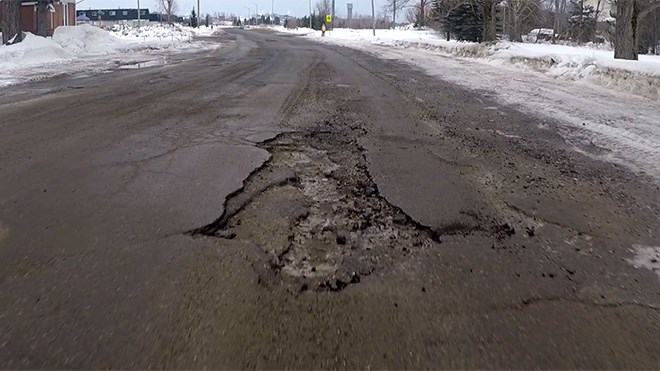There’s no doubt Greater Sudbury needs to find some kind of magic formula for our roads. It’s hard to say if one year is better or worse than another when it comes to potholes, but this year feels like a particularly bad one.
The trouble is there is no easy answer to our roads conundrum. No quick fix.
Ward 2 Coun. Michael Vagnini is on a tear about potholes this week, and rightly so. It is, after all, one of Northern Ontario’s four regional seasons: hunting season, fishing season, opening camp season and pothole season.
The councillor has an idea that might make people feel a bit better, but won’t fix the pothole problem and would likely end up costing taxapayers a lot of money.
The Ward 2 councillor has posted a draft emergency motion to his Facebook page, calling on the city to remove all checks and balances when someone files a claim against the municipality for damage to a vehicle caused by a pothole. All claims should be paid “unchallenged,” the motion reads, as long as someone has a receipt from a “reputable vendor.”
What’s more, he wants all personal injury claims where medical attention was required to be paid out, again, “unchallenged.”
Basically, Mr. Vagnini is saying that between January and April of this year, the pothole situation is so bad the city should pay every claim made against it, without any proof.
It should come as no surprise the councillor’s post elicited some very positive responses on Facebook. Why wouldn’t it? The wording of the draft motion makes it a cinch that anyone with a receipt from a mechanic for any damage that could have been sustained by hitting a pothole would get compensated, no questions asked.
No one would have to prove when they hit a pothole. In fact, they wouldn’t even have to prove they hit a pothole at all. It could end up costing us millions. Factoring in the personal injury portion, which tends to have much bigger court payouts than vehicular damage claims, and we’re talking even more money. And what about the liability issues of always assuming the city is in the wrong? It could be catastrophic.
How is this a good idea? Short answer, it’s not. Mr. Vagnini, besides being a snappy dresser, is a hardworking councillor and his heart is certainly in the right place, but I don’t think he’s thought this motion through.
It would simply cost all of us who pay taxes to pay more, likely much more. Money spent compensating “victims” of our roads would be money not spent on those very same roads.
Let’s understand how we fund municipal roads. Let me tell you, we get next to nothing from upper levels of government. Our taxes fund 80 per cent of roads spending. And we have a ton of roads, some 3,600 lane kilometres, about the distance from St. John’s, Nfld., to Sault Ste. Marie. Just think about that for a minute.
We have to face facts, Greater Sudbury doesn’t have enough taxpayers to keep every one of our roads maintained to a decent standard, let alone a good one. So we focus on the arterial and collector roads where most of the traffic is, and do local roads as needed.
Is it a perfect system? Absolutely not, but what’s the alternative? When he ran for mayor in 2014, Dan Melanson proposed using municipal bonds to fund a huge infrastructure renewal effort. It was a novel, outside-the-box idea, but voters opted to back Brian Bigger instead.
The 2018 municipal budget is a $588-million document. Right now, we’re spending a $104 million of that budget on our roads every year, split fairly equally between operating costs and capital expenditures.
Let that sink in. Greater Sudbury, a city of 161,000 people, spends more than $100 million every year just on our roads. That’s about one-sixth of our total municipal budget.
And it’s not even close to enough.
There may be a better way of making use of that $100 million, of divvying it up in a different way between capital and operations to achieve different outcomes. There is definitely room for outside-the-box thinking when it comes to the available pool of money.
A 2012 KPMG report found that Greater Sudbury would have to more than double the capital expenditures being spent on roads at the time — from $35 million to $75 million — just to maintain the road network to the recommended standard. Today, that amount would be in the ballpark of $100 million a year. That amount doesn’t address the infrastructure deficit at all, maintenance on existing infrastructure or new infrastructure costs.
Your taxes would have to go up by more than three per cent every year for a decade just to fund road maintenance.
The situation is untenable. It’s untenable for Greater Sudbury and virtually every other Canadian municipality.
We’re never going to catch up, not unless we make roads spending the absolute No. 1 municipal priority for about a decade, channeling tens of millions in spending away from other municipal priorities. What municipal service would you be willing to give up for slightly better roads?
Of course 40 years later (the average useful life of a road), we’ll have to do it all over again. I don’t think that would be the best use of our money.
Potholes are bad, no question, but they are a symptom of a much larger problem.
Mark Gentili is the editor of Sudbury.com and Northern Life.
